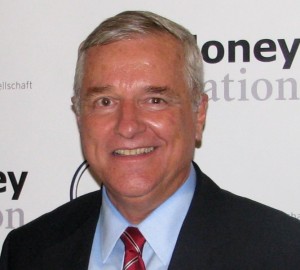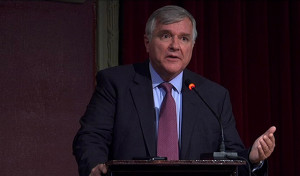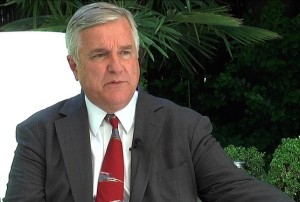James Turk gives an impression of a family man and a businessman that has been building his reputation for decades, quietly and painstakingly. When he speaks about precious metals, he does it with clarity, determination and conviction, but at the same time calmly, steadily and with the genuine interest for the interlocutor.
He is the founder of the GoldMoney, one of the largest global companies in precious metals that is safeguarding $1.5 billion of assets owned by more than 17,000 customers in 87 countries.
The reason for our conversation we find in very interesting developments in precious metal markets around the globe, but also in the occasion of his visit to Zagreb, Croatia at mid March of 2011.
He will introduce himself to Croatian business public as a keynote speaker at the first ever Croatian conference for investing in gold and other precious metals that is held on March 17th, at the Zagreb Westin Hotel. The conference is organized by Srebrozlato.com and Lider business weekly.
Could you please tell us a little bit about your career?
Turk: I trained as a banker, having joined a big New York bank in the late 1960s. I spent most of the 1970s working with the bank and living in Asia, but resigned from the bank in 1980, at about the first precious metals price peak.
It was a great experience, but I decided to focus my career on gold. It seemed clear to me from my reading of monetary history that the experiment begun in 1971 to remove gold from the global monetary system would eventually fail. I saw that inevitable failure of fiat money as an interesting business opportunity.
I had already thought of by then the core idea underlying GoldMoney. I just needed the technology to make GoldMoney possible. It took almost twenty years for that to happen, but I finally formed the company in 1998, which launched in 2001 after nearly three years of development.
What triggered your interest in precious metals since, for more than two decades, the market was considered utterly boring and unattractive?
Turk: It goes back to my upbringing. I learned the basics of sound money from my parents. My father was born in 1912 in the Austrian Empire in what is now Slovenia. He experienced the monetary turmoil after WW1, and brought this memory from his youth with him when my grandparents emigrated to the United States in 1924.
His understanding of sound money was reinforced by his experience from the bank failures during the Great Depression. So my sisters and I throughout our childhood learned the importance of hard work, savings and the value of sound money.
The overall sentiment in Croatia towards investing in precious metals is somewhere between ignorance and depreciation. Very few investors consider adding precious metals in their portfolio. How would you comment on such an attitude?
Turk: Croatia in this regard is not much different from the attitudes in the rest of Europe or North America, where most people have a blind faith in government issued fiat currency, which is currency backed by nothing other than government promises.
But I am surprised to hear this about Croatia, given what happened to the Yugoslav dinar less than 20 years ago. One would have thought that the collapse of the dinar highlighted the folly of national currencies not rigorously tied to precious metals.
So the dinar’s collapse should provide solid evidence and a clear reason to be cautious about fiat currency, particularly for everyone in the former Yugoslavia who is old enough to have watched the collapse of the dinar.
You didn’t mention Asia and the Middle East. How would you describe the overall sentiment there towards investing in precious metals globally?
Turk: Their attitude is different from here in the West. People there understand gold very well, and they see gold for what it really is – money.
Gold is not an investment. An ounce of gold doesn’t increase wealth; it only preserves it. For example, an ounce of gold buys the same amount of crude oil it did 10, 20 even 50 years ago. An ounce of gold doesn’t buy more crude oil today, so holding it did not create wealth for you. But it did preserve purchasing power, which is one of the important things money is supposed to do. And gold does that very well.
So, your assertion is that gold is much more than just mere commodity?
Turk: When the gold price rises, let’s be clear about what is happening. Wealth is not being created. Rather, the purchasing power of national currencies is eroding from inflation and other types debasement, like the low quality government bonds the ECB bought that debase the euro. We should not therefore be surprised by the record high prices of global food indices. The purchasing power of all national currencies is being eroded.
Today is not like the 1970s when people could seek safety in the Deutschemark or the Swiss franc. The DMark or course no longer exists, and the Swiss government is trying to keep the franc tied to the euro. So as misguided ECB policies erode the purchasing power of the euro, the Swiss franc will sink along with it.
The only safe haven money today is gold. In this regard, always purchase physical gold, not any paper alternatives like futures, ETFs and options. Leave those paper-gold products for professional traders and speculators.

Foto: GoldMoneyNews, Flickr
Mr. Turk, in western countries there seems to be a sharp divide within the investment community into two camps these days. The first are so called “gold bugs” who believe that precious metals are currently in a secular bull market, and that it is not even close to a bubble. The second are far from being as confident in precious metals, and believe that record prices mean that gold is right now in a bubble which is poised to burst very soon. I know which camp you belong to, so my question is: how is it that the divide is so sharp?
Turk: The divide is indeed sharp because so few people understand gold today, which is markedly different from only a generation or two ago. People look at gold’s price and make some incorrect conclusions about gold simply because the price is high.
What they should instead be looking at is gold’s value. If they do, they will conclude that gold remains relatively cheap and undervalued based on historic metrics. It should therefore be bought, regardless of today’s price. Because it is money, view gold to be a form of savings. It is always a good thing to build up your savings, particularly when you are saving sound money.
By the way, there is a bubble out there, but it is not gold. It is the US dollar and US government T-bonds. By any prudent financial measure, the US government is insolvent, and the US dollar is headed for what I call the fiat currency graveyard. Unless policies are changed soon – and I see nothing to suggest that they are in the process of changing or even will change – the dollar will collapse. It is no different from all the other fiat currencies throughout history issued by countries with too much debt and politicians with spending aspirations that far exceed revenue. The recent downgrade of Japan’s credit rating should be a warning.
I see Japan’s sovereign debt downgrade as a slow fuse that has been lit. It is a sign that those countries with large economies that are resting on their past laurels can no longer expect a free-ride from the rating agencies. Therefore, it won’t be long before this burning fuse hits the UK and a couple of other countries in Europe like Spain and perhaps Belgium. After that comes the US.
How are sovereign credit ratings connected to the price of gold?
Turk: The numerous sovereign downgrades in recent months and warnings of future downgrades are an important signal. Just like Iceland, Greece and Ireland, too many countries around the globe have borrowed too much money. Using history as a guide, when the debt burden becomes too great, countries resort to two alternatives – default or debase the currency. We can expect the present debt burden, which cumulatively far exceeds anything we have ever seen before in history, will lead to the same result. My expectation is a combination of both alternatives, but regardless which alternative is used, the purchasing power of gold will increase. The reason of course is simple. Gold is a tangible asset; its value is not based on any government’s promise. So when you own physical gold, your wealth is not contingent upon any counterparty risk.
In the future, people reading monetary history will look at today’s sovereign debt bubble the same way we look back in amazement at the Tulip Bulb Bubble in Holland, Mississippi Bubble in France and South Sea Bubble in Britain. We shake our heads in wonderment how so may people could be fooled, which is the same thing future generations will say about today. How could so many people be persuaded in believing that government bonds were a safe way to protect wealth?
Is that why you have repeated on more than one occasion that an ounce of gold will reach $8000 by 2013 to 2015?
Turk: Yes, that is part of it. What I am basically saying is that history will repeat. To explain, I first made this forecast in 2003 when gold was trading about $350 per ounce. It took then about $10 to purchase what $1 purchased in 1971 because of more than three decades of inflation.
I mention 1971 on purpose because gold was $35 that year and rose to over $800 in 1980. So the premise of my forecast is that gold will repeat its price performance from the 1970s, meaning that on an inflation-adjusted basis, gold will rise from $350 to $8,000. I have seen nothing over the years to suggest that I should change my forecast.
In the European Union gold bullion can be purchased without any VAT. In contrast, the Croatian government throws all gold into the same basket, no matter whether it is for jewelry or for investment purposes, and taxes it 58 percent. What would be you recommendation to the Croatian authorities in regard to the taxation scheme for gold? Are there any changes that you would propose?
Turk: The government is preventing the Croatian people from saving money, which is harmful. Saving money is a good thing. It and the protection of property rights are the backbone of capitalism, and capitalism is the basis by which societies raise their standard of living. So I would recommend that gold should be allowed to exchange freely with all national currencies without any tax consequences.

Foto: AEMPTV, Flickr
If you weren’t involved in the precious metals business, what would be the next best thing you would wish to engage in? Or you would prefer retirement?
Turk: I really don’t see myself being retired, though as I get older, I am no doubt slowing down somewhat. If I hadn’t been interested in money and finance, I probably would be involved in education. I enjoy reading history and over the years have accumulated over 2400 books in my library dealing with money, banking and finance.
In fact, focusing on education is what I intend to do as I spend less time in GoldMoney and more time with the GoldMoney Foundation, which I established last year. Its purpose is to provide educational material of the highest standard that explains the role of gold and silver as money and currency, and their importance in this role to society.
You talk about the a special role of gold in society. Could you please explain that idea a bit further?
Turk: History shows that there is a clear link between gold and human liberty, and as many governments around the globe become more authoritarian, it is becoming increasingly clear that gold is needed to keep governments under control. The GoldMoney Foundation has already begun broadcasting this message with the projects it has already undertaken.
Also, history clearly illustrates that fiat currency systems have always wound up with collapse and economic chaos. I want to let people know that there exists a sound money with thousands of years of history that enables people to protect themselves and their families, come what may. That sound money of course is physical gold.
This has been very informative interview, Mr. Turk, which I am sure our readers will find interesting. Thank you!
Turk: Thank you for providing the opportunity to share my views.
Interview conducted by Sven Sambunjak, editor-in-chief, Srebrozlato.com

